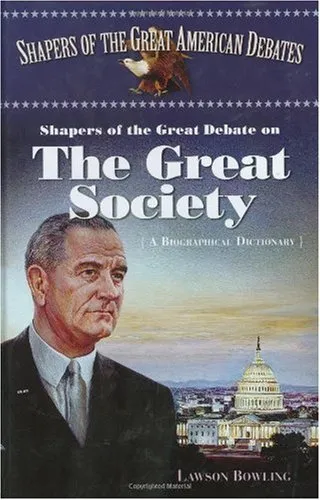Shapers of the Great Debate on the Great Society: A Biographical Dictionary (Shapers of the Great American Debates)
4.0
Reviews from our users

You Can Ask your questions from this book's AI after Login
Each download or ask from book AI costs 2 points. To earn more free points, please visit the Points Guide Page and complete some valuable actions.Introduction to "Shapers of the Great Debate on the Great Society: A Biographical Dictionary"
"Shapers of the Great Debate on the Great Society: A Biographical Dictionary" is a compelling exploration of one of the most pivotal and transformative periods in modern American history. Written by Lawson Bowling, this book serves as both an informative resource and a powerful historical narrative, showcasing the influential figures who molded, supported, and opposed President Lyndon B. Johnson's Great Society initiatives during the turbulent 1960s. Through a uniquely structured biographical dictionary format, it provides readers with in-depth profiles of the key individuals involved in this landmark debate. Whether you're a student, academic, or general reader curious about U.S. history, this book offers a comprehensive roadmap to understanding the ideas, struggles, and legacies of the era's most influential policymakers, activists, and challengers.
Detailed Summary of the Book
The Great Society was one of the most ambitious domestic programs ever launched in America, spearheaded by President Lyndon B. Johnson in an effort to eliminate poverty, promote equality, and improve the quality of life for all citizens. This book delves into the ideas and individuals behind its creation, implementation, and resistance. Through a meticulous focus on biography, the volume highlights the roles of prominent policymakers such as Johnson himself, his advisers, key congressional leaders, and the critics who shaped public discourse around these reforms.
Each biography in the book is thoughtfully crafted to provide context for these historical debates. Readers will discover not just the facts of an individual's life, but also their ideological positions, social and political networks, and the broader impact of their ideas. Figures such as Robert F. Kennedy, Martin Luther King Jr., Barry Goldwater, and Ronald Reagan appear alongside grassroots activists, journalists, and intellectuals who played critical roles in shaping the nation's response to LBJ's vision.
From topics like civil rights and education reform to war on poverty initiatives and cultural policies, this biographical dictionary covers a vast array of programs and counter-arguments. The book is not just about major players but also contextualizes the voices of opposition that ultimately molded the trajectory of the Great Society agenda. This comprehensive approach paints a nuanced picture of democracy in action.
Key Takeaways
- The Great Society marked a significant expansion of the U.S. federal government's role in social issues, with groundbreaking policies on civil rights, healthcare, education, and poverty.
- Opposition to the Great Society from conservative leaders and grassroots movements underscored the enduring ideological divide in America over the role of government.
- The book reveals how ideas and policies are shaped not only by presidents and high-profile politicians but also by a wide variety of social actors, including insurgent critics, journalists, and community organizers.
- While the Great Society achieved historic successes in areas like Medicare and civil rights legislation, its legacy remains controversial, especially in light of criticisms over effectiveness and unintended consequences in later decades.
Famous Quotes from the Book
"The Great Society was more than a set of policies—it was a vision of America where everyone had the opportunity to prosper, and where the federal government played a pivotal role in correcting societal inequalities."
"The most remarkable aspect of the Great Society debates was the way in which they revealed the deep tensions between liberty and equality in the American political tradition."
"In understanding the Great Society, we must focus not only on those who created it but also those who resisted it. Both forces were necessary to shape its ultimate legacy."
Why This Book Matters
This book matters because it provides a deep dive into one of the most important periods in American history. As today's society continues to grapple with many of the same issues—economic inequality, racial injustice, and debates over the size and role of government—it is crucial to understand the historical precedents and lessons of the Great Society.
By focusing on the biographies of key figures, "Shapers of the Great Debate on the Great Society" offers a human-centered approach to understanding policy debates. It reminds readers that history is not predetermined, but shaped by the thoughts, actions, and ideologies of individuals. It also emphasizes that understanding dissent and diverse perspectives is as important as celebrating achievement.
Scholars, students, and history enthusiasts alike will find in this book a valuable resource not only for learning about the 1960s but also for engaging in an ongoing conversation about the kind of society we wish to build in the future. Its biographical format makes complex political and social dynamics accessible while still retaining the richness of historical analysis.
Free Direct Download
Get Free Access to Download this and other Thousands of Books (Join Now)


